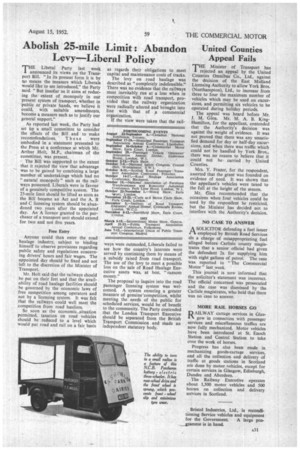Abolish 25-mile Limit : Abandon Levy Liberal Policy
Page 33

If you've noticed an error in this article please click here to report it so we can fix it.
THE Liberal Party last week announced its views on the Transport Bill. "In its present form it is by no means the measure which Liberals would like to see introduced," the Party said. "But insofar as it aims at reducing the extent of monopoly in our present system of transport, whether in 'public or private hands, we believe it could, with suitable amendments, become a measure such as to justify our general support."
As reported last week, the Party, had set up a small committee to consider the effects of the Bill and to make rccomnfendations. Th es e were embodied in a statement presented to the Press at conference at which Mr. Arthur Holt, M.P., chairman of the committee, was present.
The Bill was supported to the extent that it rejected the view that advantage was to be gained by combining a large number of undertakings which had no " natural monopoly" such as the railways possessed. Liberals were in favour of a genuinely competitive system. The 25-mile limit should be lifted as soon as the Bill became an Act and the A, B and C licensing system should be abandoned two years after the appointed day. An A licence granted to the purchaser of a transport unit should extend for two and not five years.
Free Entry Anyone could then enter the road haulage industry, subject to binding himself to observe provisions regarding public safety and regulations concerning drivers' hours and fair wages. The appointed day should be fixed and not left to the discretion of the Minister of Transport.
Mr. Holt said that the railways should be put on their feet and that the availability of road haulage facilities should be governed by the economic laws of free competition among operators and not by a licensing system. It was felt that the railways could well meet the competition from road hauliers.
So soon as the economic...situation permitted, taxation on road vehicles should be reduced to a level which would put road and rail on a fair basis as regards their obligations to meet capital and maintenance costs of tracks.
The levy on road haulage was described as "completely indefensible." There was no evidence that the railways must inevitably run at a loss when in competition with road transport, provided that the railway organization were radically altered and brought into line with that of a commercial organization.
If the view were taken that the rail ways were outmoded, Liberals failed to see how the country's interests were served by continuing them by means of a subsidy raised from road transport. The use of the levy to meet a possible loss on the sale of Road Haulage Executive assets was, at best, "ransom money."
The proposal to inquire into the road passenger licensing system was welcomed. A system ensuring a greater measure of genuine 'competition, whilst meeting the needs of the public for scheduled services, would be of benefit to the community. The Party contended that the London Transport Executive should be separated from the British Transport Commission and made an independent statutory body.




















































































